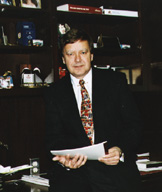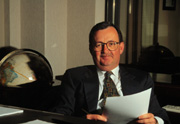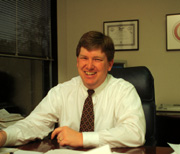
by Su Clauson-Wicker
No small town in the South or Midwest seems complete without the plaid beret of the Heilig-Meyers' logo man in its business district. It's no secret that the Richmond-based company has carved its niche in small-town America to become the largest home-furnishings retailer in the world.

But most folks don't know how much its successful course is charted by people educated at Virginia Tech. Of Heilig-Meyers' top management, the president, the chief financial officer/executive vice president, the senior vice president of finance, the vice president/controller, and the vice president of internal audit all are Hokies.
This Tech dominance had its origins in the accounting department at Virginia Tech in the 1960s, where Bill Jones '68 (now vice president for internal audit) and Joe Jenkins '68 (now executive vice president and chief financial officer) had transferred in from engineering to converge with Troy Peery '68 (now president), a transfer student from a smaller college.
"We knew each other--the department was small enough that everybody knew each other--but we didn't make any plans to work together," Jenkins says. "In fact, we took separate directions for quite a few years."
They did remain friends, despite the fact that "Joe always made great grades and ruined the curve for the rest of us," Jones says. They kept in touch through professional meetings. Jones and Peery roomed together while both were working for the Arthur Young firm in Richmond.
Peery led the Virginia Tech charge on Heilig-Meyers 25 years ago, although he admits Heilig-Meyers essentially snatched him from Arthur Young.

"I was happy with Arthur Young. I wasn't looking for a job for myself when I asked about a position for an out-of-state friend. Heilig-Meyers wasn't interested in his skills; they recruited me," he says.
Peery had a rapid ascent. Starting as assistant controller, he moved into the controller slot two months later and became company treasurer within a year. He climbed through the ranks--vice president for finance, senior vice president for finance, executive vice president, and president, a position he's held since 1985. Peery's chief responsibilities are overseeing the company, investor relations, and general acquisitions.
As president, he no longer makes many hiring decisions, but in the past he has been responsible for bringing a number of fellow Hokies into the fold. "I've hired quite a few Virginia Tech graduates. They came in well-prepared, and I often knew someone who knew them, so it was easy to make a quality judgment," he says.

In 1988, Peery recruited his former classmate, Joe Jenkins, then a managing partner at Deloitte and Touche, as his chief financial officer and one of the company's three executive vice presidents. Three years later, Peery's former roommate, Bill Jones, was ready to leave his vice-president post at Dominion Pottery to become the fast-growing furniture company's vice president of internal audit.
Another of Peery's Hokie hires was Roy Goodman (finance '80), who came to work as an analyst straight from Blacksburg fully intending to return to Virginia Tech for his MBA the next year. "But the company was growing so rapidly, they asked me to stay and offered to pay for my MBA at the University of Richmond," Goodman says.
Goodman's career path has been similar to Peery's, though in a much larger Heilig-Meyers. He owes his successes to a solid education, a sharp business mind, and a liberal dash of chutzpah. His pivotal moment came late one night about six years into his Heilig-Meyers career.
"I had been working late with Troy, and he had mentioned that he was getting ready to hire a treasurer from outside the company because no one inside had enough experience. At 9 p.m., I headed out of the office thinking about that, and, on my way home, decided to go back to pitch myself for the job. Luckily, Troy was still working because I don't know if I would have done the same thing the next morning," Goodman says.
Although Peery still seemed inclined to hire the outsider, he mulled over Goodman's proposition and, three days later, offered him the job. Goodman, at 29, became the youngest treasurer of a Fortune 1000 company.
"Roy had all the right attributes, just not the experience. I took a chance and hired him. It was a chance that worked out for him and for the company," says Peery. "That opportunity would not have been available to him again for a long time."
At 39, Goodman is senior vice president of finance and has spent his entire career at Heilig-Meyers. "I was attracted here by the same thing that attracts me today--Heilig-Meyers' fantastic growth. It is growing so rapidly that you feel like you're working for a new company every two or three years. Yet it has a family atmosphere. People often work together and socialize together; we're friends and business colleagues."
Goodman says the 20 or so Virginia Tech alumni at the corporate headquarters show some solidarity during football season. Many have gone to bowl games or, like Bill Jones, had parties to honor Tech's successes.
One glance into CFO Joe Jenkins' corner office establishes him as the biggest Hokie of them all. Jenkins, who serves on Virginia Tech's Board of Visitors, has dedicated one whole wall and a display case to Virginia Tech memorabilia. He is especially proud of his autographed Sugar Bowl football, a gift from Coach Frank Beamer. Heilig-Meyers is a sponsor of the coach's post-game television show.
Jenkins also chairs the steering committee on corporate fund raising for the Campaign for Virginia Tech, sits on Tech's accounting advisory board, and has established a Virginia Tech scholarship in his name. He's pleased with the Tech alumni who work for him. "In our experience, they come out well-prepared and hit the ground running," he says.

After Jenkins was recruited by Peery, he hired Tom Crump (accounting '78) as vice president and controller in 1992. Crump, who had experience at Arthur Young, came to Heilig-Meyers from the Investors Financial Corp., where he was CFO.
"Crumpie," as he is sometimes affectionately known among the other vice presidents, reminds colleagues to pay their Hokie Club pledges. Like many Heilig-Meyers Hokies, he has attended all Tech's bowl games. Attracted by the company's growth, Crump has found himself, in addition to his other duties, in charge of orchestrating Heilig-Meyers' move to new, larger corporate headquarters next year.
"With our recent acquisition of the Rhoads furniture chain, we've gotten into some larger markets, including Atlanta and Charlotte," he says. "People may think of us as a Southeastern company, but we're now in at least two-thirds of the U.S. states and Puerto Rico."
"When I started work here five and a half years ago, Heilig-Meyers had about 300 stores; now we have 934," says Jones. "Small-town markets are still our niche, but we're branching out."
Heilig-Meyers was founded in 1913 by two Lithuanian immigrants who had entered the retail business peddling piece goods to farmers around Goldsboro, N.C. The majority of Heilig-Meyers stores are still located in towns with fewer than 50,000 people, where they are often the area's sole furniture retailer. Approximately 80 percent of all customers rely on the stores' installment finance plan, and this financing is a strong factor in the company's profits. According to Peery, the company will continue to grow; he hints that it could double in the next year or so. "The time is so ripe for consolidation in the furniture business," he says. "We have tremendous opportunities for growth in this company."
"In fact," he adds, "you can give Tech business-management graduates this advice: If you're willing to have the small-town experience [of our retail stores], you can have a quicker path to success than almost anywhere else."
Home | News | Features | Research | Philanthropy | President's Message | Athletics | Alumni | Classnotes | Editor's Page